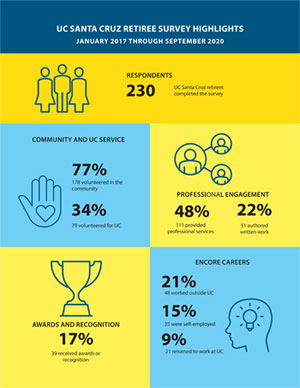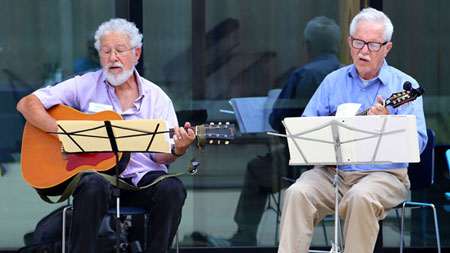Campus News
UC retirees embrace an active, engaged lifestyle
University of California retirees are an active, engaged group of individuals who are giving back to their communities through volunteerism and launching new endeavors. A recent survey of nearly 5,000 UC retirees provides a snapshot of how retirees are using their time and sharing their talents. The survey report, “UC Retirees: Generous Talents, Enduring Community,” […]




University of California retirees are an active, engaged group of individuals who are giving back to their communities through volunteerism and launching new endeavors. A recent survey of nearly 5,000 UC retirees provides a snapshot of how retirees are using their time and sharing their talents.
The survey report, “UC Retirees: Generous Talents, Enduring Community,” focuses on the lives of 4,980 retired UC staff and non-senate academics who participated in an anonymous, online questionnaire last fall.
One of the most common ways respondents are spending their retirement is volunteering regularly for community and civic organizations, faith-based groups and political causes. While many commented that their volunteer activities have been curtailed by the pandemic, most plan to resume once it’s safe to continue.
And 25% of systemwide respondents said they have volunteered for UC, indicative of the enduring connection many feel to their home campuses, medical centers and labs and their strong support for the university’s mission. Retirees for UC have served as volunteer mentors, teachers, advisers, fundraisers and participants in many campus programs and activities.
Thousands of retirees have also donated more than $60 million to UC campuses over the past four fiscal years, according to data provided by retiree associations, retirement centers, and development offices.
“I believe the project underscores that if individuals have a fondness for their campus and communities, they will freely share their time, talents and treasure,” said John Meyer, chair of the Council of University of California Retiree Associations. Meyer retired from UC Davis in 2014 as its Administrative Vice Chancellor.
The report will be shared with university leaders, who support maintaining the strong relationship between retirees and UC, Meyer said.
“One of our responsibilities is to share with university and campus leaders any barriers to such a positive relationship,” he said. “I have found university leaders very interested in ensuring this relationship thrives.”
A majority of respondents reported having an active lifestyle: 60% were engaged in staying physically fit; 58% had traveled; 50% gardened; 47% spent time outdoors and in nature; and 32% enjoyed the performing arts.
The survey also showed that more than half of the respondents, 53%, have served as caregivers.
The high number of caregivers could be due in part to the upheaval caused by the pandemic, survey organizers said. Some respondents noted that they were helping out their children who had become unemployed or assisting with the care of grandchildren learning at home while their parents worked.
The UC Santa Cruz retirement community exemplifies the richness of retired life through giving back, caring for others, creativity and expression, activism, cultural appreciation, and having fun with family and friends.
“This survey shows the vitality of retired UC staff. Our retirees are active and involved in a variety of pursuits,” said Bill Parro, President of the UC Santa Cruz Retirees Association. “I hope that this report helps motivate us to stay in touch and share in our mutual endeavors.”
Highlights from UCSC retirees:
“These surveys confirm that many UC retirees maintain a continuing relationship with the University and are productive, contributing citizens in their communities,” said Lee Duffus, former Chair of CUCRA, who retired from UC Santa Cruz as the Assistant Vice Chancellor for Student Services.
The survey was sponsored by CUCRA to capture the activities of retirees from 2017 – 2020. CUCRA is a systemwide consortium of 13 organizations representing retirees from nine campuses, three national laboratories and the UC Office of the President. Emeriti faculty participate in a separate survey, sponsored by the Council of University of California Emeriti Associations (CUCEA).
“We want to be clear that this is not a true random survey,” explained Meyer. “The responses measured are from those who chose to respond — and those individuals likely maintain an interest in serving their campus.”
Still, Meyer said, “We believe it’s valuable for our organization to assess and report on the level of engagement retirees maintain with their campuses and their communities. This can then be shared with university and campus leaders to underscore the ongoing value of retirees.”